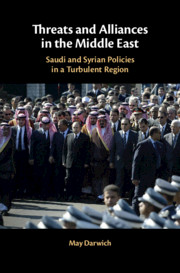Book contents
- Threats and Alliances in the Middle East
- Threats and Alliances in the Middle East
- Copyright page
- Contents
- Figures and Tables
- Acknowledgements
- Note on Transliteration and Translation
- 1 Introduction
- 2 Why and When States Perceive Threats
- 3 The Iran–Iraq War (1980–1988)
- 4 The 2006 Lebanon War
- 5 The 2009 Gaza War
- 6 Conclusion
- Bibliography
- Index
1 - Introduction
Debating Threat Perception
Published online by Cambridge University Press: 09 September 2019
- Threats and Alliances in the Middle East
- Threats and Alliances in the Middle East
- Copyright page
- Contents
- Figures and Tables
- Acknowledgements
- Note on Transliteration and Translation
- 1 Introduction
- 2 Why and When States Perceive Threats
- 3 The Iran–Iraq War (1980–1988)
- 4 The 2006 Lebanon War
- 5 The 2009 Gaza War
- 6 Conclusion
- Bibliography
- Index
Summary
Chapter 1 presents an introduction to the book’s main research question and an overview of its overarching argument. It also situates the book’s argument within the existing literature on threat perception within the IR discipline and engages critically with realism, constructivism, and regime security approaches. In the discipline of International Relations (IR), threat perception has been a constituent element in the study of alliances. The Middle East region provides a rich pool for empirical puzzles in the study of threats and alliances. The existing literature on threat perception and alliance formation has been divided between those favouring ideational forces and those favouring material forces as drivers of threat perception. This book sheds new lights on this debate by addressing the conditions that can explain when ideational forces will be predominant in states’ fear of another and when material forces will be decisive. The chapter also outlines the cases studies employed in the book. It gives an overview of the comparative case studies of Saudi and Syrian threat perceptions and alliance choices during three wars in the Middle East: The Iran–Iraq War (1980–8), the 2006 Lebanon War, and the 2009 Gaza War.
Keywords
- Type
- Chapter
- Information
- Threats and Alliances in the Middle EastSaudi and Syrian Policies in a Turbulent Region, pp. 1 - 27Publisher: Cambridge University PressPrint publication year: 2019

